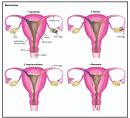Abnormal uterine bleeding is define as bleeding in the uterus that is irregular in amount, timing or duration.
Although abnormal uterine bleeding is not life threatening, it exacts a large emotional and physical toll on women.
Heavy periods can cause pain and discomfort and increase the risk for iron deficiency anemia. It can impair a woman’s life, leading her to miss work and social events.
Acute excessive bleeding can lead to hemodynamic instability requiring hospitalization for blood transfusion and fluid volume management.
In many women, a hormone imbalance, such as too much estrogen or not enough progesterone, causes abnormal uterine bleeding.
Polyps or small and large growths in the uterus can also cause bleeding as well as cancer of the uterus and infection of the cervix.
Sometimes a thyroid problem causes bleeding. Symptoms include menstrual bleeding that occurs more than often than twenty one days or farther apart than thirty five days, menstruation that lasts longer than seven days, blood loss of more than eighty millimeters, releasing blood clots or changing soaking large pad per hour are considered heavy.
It affects women from twelve to forty five years old, but occurs most on pre menopausal age during which the hormonal system is most vulnerable.
In the years before menopause, women have months when they don’t ovulate causing the thickening of the uterus that causes bleeding.
Depending on many factors such as age, severity of the bleeding and whether you want to have children, abnormal uterine bleeding maybe treated by taking hormones like oral contraceptives and progesterone, non steroidal anti inflammatory drugs, transenamic acid and antibiotics. In some cases, surgery (hysteroscopy and hysterectomy) may be needed.
Menstrual cycle is important so you have to keep track of the date and length of your bleeding and mark it in the calendar. Women should be advised regarding the importance of their menstrual period.
Often taken for granted since the adverse effects of an irregular menstrual cycle are not as evident as other medical conditions, it warrants further attention and management. A regular monthly period is indicative of good health together with an active and vibrant lifestyle.
